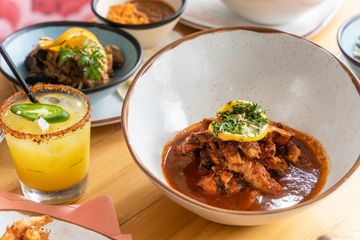Discover why churros are everyone’s favorite after every Mexican meal
Is Mexican Food Healthy? Unboxing the Nutritional Perks of Conventional Active Ingredients
The concern of whether Mexican food is healthy welcomes an exploration of its traditional components. Beans and corn work as fundamental staples, rich in healthy protein and fiber. Avocados supply advantageous fats, while numerous herbs and seasonings include flavor and health and wellness benefits - freshly made guacamole. With each other, these components develop a tapestry of nutrition. The healthfulness of Mexican cuisine often depends on prep work methods and part sizes. What duty do these elements play in identifying its general nutritional value?
The Power of Beans: Healthy Protein and Fiber-Rich Staples
Commonly overlooked, beans serve as a foundation of Mexican food, supplying a wealth of nutritional benefits. Rich in healthy protein, they are a superb plant-based alternative for those seeking to satisfy their nutritional healthy protein requires. This high healthy protein content supports muscle mass repair service and development, making beans invaluable for both vegetarians and meat-eaters alike. Furthermore, beans are an exceptional source of dietary fiber, which aids in digestion and promotes a feeling of fullness, potentially assisting with weight administration.
The selection of beans made use of in Mexican recipes, such as black beans, pinto beans, and kidney beans, adds to a varied taste account and can boost dishes nutritionally. Beans are low in fat and contain essential vitamins and minerals, including folate, magnesium, and iron. Together, these attributes make beans a crucial active ingredient, supplying both nutrients and food in conventional Mexican fare.

Corn: a Versatile Grain With Nutritional Benefits
Corn attracts attention as a flexible grain basic to Mexican cuisine, commemorated not only for its cooking applications but additionally for its outstanding dietary profile. As a key ingredient in recipes like tortillas, tamales, and pozole, corn provides necessary nutrients that contribute to a well balanced diet. Rich in carbohydrates, it acts as a significant power resource, while likewise being reduced in fat, making it a favorable choice for various dietary demands.
Corn is an excellent source of dietary fiber, which helps in food digestion and promotes satiety. It consists of substantial amounts of vitamins such as B-complex vitamins, which are vital for basal metabolism. The existence of anti-oxidants, specifically carotenoids, contributes to overall health and wellness by lowering oxidative stress. Furthermore, corn is gluten-free, catering to those with gluten level of sensitivities. On the whole, the nutritional benefits of corn underscore its significance in standard Mexican food and its duty in a healthy diet.
Avocados: Healthy Fats and Nutrients in Every Bite
Avocados play a considerable function in Mexican cuisine, matching meals with their velvety appearance and abundant taste. Past their culinary appeal, avocados are celebrated for their outstanding nutritional account. They are an abundant resource of healthy and balanced monounsaturated fats, which can aid reduced negative cholesterol degrees and support heart health. Furthermore, avocados are packed with necessary vitamins and minerals, including potassium, vitamin E, and B vitamins, contributing to total health.
The high fiber material in avocados help food digestion and advertises satiation, making them a valuable enhancement to any type of dish. Their special nutrient structure can likewise support skin health and offer anti-inflammatory benefits. Integrating avocados into conventional Mexican meals or enjoying them as a standalone snack can boost both taste and nourishment, demonstrating why they are a cherished staple in Mexican cuisine. Generally, avocados supply a delicious method to delight in healthy and balanced fats and crucial nutrients in every bite.

Herbs and spices: Flavorful Health Boosters
While enjoying the abundant tastes of Mexican food, one can not overlook the crucial duty that spices and herbs play in boosting both preference and wellness. Components such as cilantro, oregano, and chili peppers not just add to the lively taste profile yet also supply significant health and wellness advantages. Cilantro is recognized for its cleansing buildings, helping to eliminate heavy metals from the body, while oregano is packed with anti-oxidants and has anti-inflammatory results.
Chili peppers, a staple in several Mexican dishes, include capsaicin, which has been linked to enhanced metabolic rate and discomfort alleviation. Additionally, spices like cumin and coriander support digestion and may aid in blood glucose guideline. Including these flavorful health boosters into meals not just boosts the cooking experience but likewise promotes general health, making Mexican food not simply delicious, however additionally nutritionally advantageous.
Traditional Food Preparation Approaches: Enhancing Nourishment and Taste
Standard cooking methods in Mexican cuisine play a vital role in enhancing both nourishment and taste, as they commonly prioritize classic methods and fresh components. Techniques such as nixtamalization, where corn is saturated and prepared in an alkaline option, not only improve the nutrient account of tortillas however also boost their digestibility - hand crafted margarita. In addition, the usage of sluggish cooking approaches, like cooking or braising, allows tastes to blend magnificently while retaining the honesty of the components

Regularly Asked Inquiries
Are Mexican Food Portions Typically Larger Than Various Other Foods?
Mexican food sections are commonly larger than those of numerous other foods. This particular shows conventional dining techniques, stressing common sharing Your Domain Name and hearty meals, which can result in a more significant offering size in general.
How Does the Prep Work Technique Affect Healthiness of Mexican Food?
Prep work approaches considerably influence the healthiness of Mexican food. Techniques such as cooking or steaming protect nutrients, while frying can enhance unhealthy fat web content. Options of components and cooking designs inevitably identify total nutritional worth.
Can Mexican Food Be Customized for Specific Nutritional Restrictions?
Mexican food can indeed be customized for specific nutritional restrictions. Replacements, such as using corn tortillas for gluten-free diet regimens or integrating even more vegetables, make it possible for individuals to appreciate conventional tastes while fitting numerous nutritional demands.
What Prevail Misconceptions Regarding Mexican Food and Health?
Typical misconceptions regarding Mexican food consist of the belief that it is inherently harmful, overly hot, and only focused on fats. In truth, traditional meals usually feature healthy active ingredients and can be tailored to different nutritional demands.
Are There Healthier Choices at Mexican Dining Establishments?
Healthier choices at Mexican restaurants usually include barbequed meats, beans, and fresh veggies. Picking recipes that emphasize whole components and staying clear of hefty sauces can lead to a more healthy dining experience, advertising total health.
The variety of beans used in Mexican recipes, such as black beans, pinto beans, and kidney beans, adds to a varied taste account and can boost dishes nutritionally. Avocados play a significant role in Mexican cuisine, complementing dishes with their velvety structure and rich flavor. Integrating avocados into conventional Mexican meals or enjoying them as a standalone snack can enhance both flavor and nutrition, demonstrating why they are a beloved staple in Mexican food. While enjoying the click for source abundant tastes of Mexican food, one can not forget the crucial duty that spices and herbs play in boosting both preference and wellness. Standard food preparation techniques in Mexican cuisine play a vital role in enhancing both nourishment and taste, as they commonly focus on fresh components and time-honored techniques.